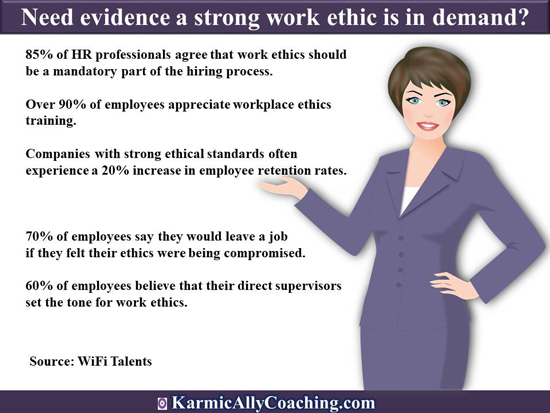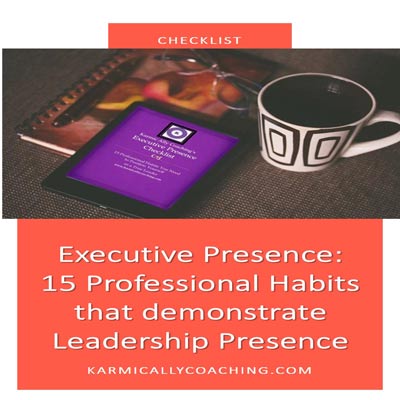This post has already been read 257 times!
Additional Resources mentioned in Work Ethic audio
Karmic Ally Coaching’s Executive Presence Checklist
Prefer to read? Transcript below

The importance of building a strong work ethic cannot be underestimated. That’s the soft skill inside the gravitas element of executive presence. It supports your achieving career goals, climbing the corporate wall and being seen as a leader.
Sometime back, a friend was telling me about her boss who she felt didn’t have executive presence.
Her view was based on her observation that at high level leadership meetings, her boss maintained a quiet demeanor and didn’t speak up the way the other leaders did.
At the higher echelons of an organization, the game is different. Her boss definitely had executive presence and was seen as a leader.
She was politically aware and knew how to maintain her integrity. She understood how to get things done and who the ‘power players’ were.
I listened to what was being said and told my friend to observe and learn from her boss.
Her boss was the perfect role model for strong work ethics that were demonstrated in her executive presence.
It didn’t surprise me when a year later, her boss got a very senior promotion that covered all regions where the company operated.
40 years ago, when I joined the workforce, the definition of good work ethics was being a reliable trustworthy worker. It meant being a professional with high integrity, honesty and ethics.
There were a number of other indicators of good work ethics back then which are equally important in the modern corporate world.
Being a diligent worker who is also a team player or a manager who doesn’t throw his team under the bus when something goes wrong is always important.
Hard and technical skills will always matter, and a good professional will up skill to stay relevant. Nowadays, there’s a stronger slant towards soft skills.
In fact, it’s our soft skills that give us the competitive edge to be considered leadership material.
They are also transferable skills between industries.
So in the 21st century, we also need to have high emotional intelligence. We need to be seen as possessing executive presence and know how to apply critical thinking among soft skills.
Hi, I’m Vatsala Shukla from Karmic Ally Coaching. Today, I’m going to explore another soft skill that’s in demand.
In fact, according to research from ADP, it’s a top skill that employers are looking for in new hires – a strong work ethic.
It’s not just 1 study. I found 2 more that indicate the importance of ethics in the workplace.
According to the ZipDo Education Report 2024, 85% of employers believe that work ethic is the most important attribute when considering job candidates.

WiFi Talents too explored the role significant impact of work ethics in the workplace. The numbers indicate the need to foster a culture of ethics in the workplace.
85% of HR professionals agree that work ethics should be a mandatory part of the hiring process.
Another statistic, over 90% of employees appreciate workplace ethics training.
Companies with strong ethical standards often experience a 20% increase in employee retention rates.
70% of employees say that they would leave a job if they felt their ethics were being compromised.
And finally, 60% of employees believe that their direct supervisors set the tone for work ethics.
Clearly both companies and employees understand the need for strong work ethics.
What exactly is work ethics?
The dictionary definition of work ethic is that it’s a belief in work as a moral good: a set of values centered on the importance of doing work and reflected especially in a desire or determination to work hard.
In reality, it’s a lot more than working hard.
Work ethic involves a set of principles, values, and beliefs that influence how individuals behave and make decisions in their professional lives. It directly affects productivity, job satisfaction, and the overall reputation of a company.
It’s a learnable skill and many of us learn about it from observing our seniors and bosses and imbibing what we see.
This means the onus is on us as leaders to demonstrate strong work ethic traits and set the gold standard.
Of course, companies and organizations will provide corporate training on work ethics. If you belong to a statutory body, then it will be part of your course curriculum.
As time changes, ethics evolves and you might have to do courses on ethics as part of your continuing professional development.
But knowledge isn’t enough. Its practice and walking the talk that ultimately leads to strong work ethics.
It begins with your work ethics.
Staying positive, refusing to procrastinate, and maintaining your focus are all necessary ingredients to build this strong and rewarding work ethic.
Other strategies to become a great worker are setting a goal of dependability, always meeting deadlines, and stepping up to fill unmet needs.
The strategies that you use will also help you demonstrate ethical presence and that in turn will enhance your executive presence.
Let’s take a look closer at each of these methods to construct a sturdy work ethic:
The first is staying positive.
You’ve probably heard the expression, “Attitude is everything.” That’s definitely true when you’re working on creating a resilient work ethic. Your work improves when you approach it with a positive attitude.
No matter what, staying positive about your tasks will help you become a rock star at work. You’ll not only stand out to your supervisor, but your colleagues will notice it too.
Secondly, refuse to procrastinate.
Although you may be tempted to put off doing certain tasks or projects, make “Do it right now,” your mantra. You’ll find that often jobs are quickly and easily done in less time than you would have spent obsessing about the task.
Third, keep your focus.
In corporate life we are often swamped with information. Reports can run to pages, data can appear exhausting, presentations can go on for hours.
Are you able to sift through the detail and get to the point?
Can you bring clarity to complexity?
Do you ask for more and more information before you are able to make a decision, or can you identify just the key fact you need and move forward?
Does your input help people see the light or add more layers of complexity?
Focus is what my friend’s boss was good at and that got her the promotion many thought she wouldn’t get.
When your plans are clear, you’ll get more work done in less time. Put a sticky note on your calendar and computer. Organize your desk the day before you plan to start that huge project. Start focused and stay focused. You’ll work like a machine when you devote your attention on the subject at hand.
Set yourself a goal of dependability.
When you go the extra mile to complete your work, people will learn to trust that when you’re given a job, you’ll do it.
Endeavor to be known as the one whom your boss and co-workers can always depend on to get the job done.
This fifth method is crucial to developing a strong work ethic. It’s to always meet deadlines.
Do whatever you have to do to meet a deadline. Of course, the best way to ensure you consistently meet deadlines is to negotiate in advance of taking on the task, so you have a bit of a say in the schedule.
In the event your supervisor assigns you a project that must be done by a certain date in the near future, clarify right away with your boss what he sees as your priorities.
This way, you’ve gained permission to alter the due dates on some of your other tasks to take on the urgent project.
If you communicate right away any concerns you have about deadlines, you’re in a position to negotiate some of them. The bottom line is you’ll ultimately be meeting deadlines approved by your supervisor.
A final ninja method to demonstrate strong work ethics and gravitas is to step up to fill unmet needs.
Volunteering to take on gaps in labor will make every supervisor you work for the happiest person in the world.
We’ve all been on a committee where jobs were being assigned, the moderator got to a certain task, and everyone shrank up or whispered, “Oh, I’m not taking that job!”
A person with a strong work ethic views these situations as opportunities to stretch himself or herself and show what he or she can do.
You might even discover a special talent you possess when you volunteer to take on a job. Consider it another line on your resume when you agree to write the department manual or perform some other task. Learn to step forward to fill unmet needs.
When you follow these situation suggestions, you’ll develop great confidence in your work and lend credence to others perceiving you’re having executive presence.
Our Executive Presence stands on the shoulders of our character, our values, how we carry ourselves, how we think, what we say and what we do.
It’s how we position ourselves as leaders or potential leaders. I invite you to download Karmic Ally Coaching’s free Executive Presence checklist and see which other areas you need to focus on to be considered as having leadership presence.
And if you have more queries, please get in touch. Bye for now.






 I adhere to the Certified Coaches Alliance Code of Ethics and Standards. A copy is available on request.
I adhere to the Certified Coaches Alliance Code of Ethics and Standards. A copy is available on request.
 Let's Talk through the Connect Form:
Let's Talk through the Connect Form: